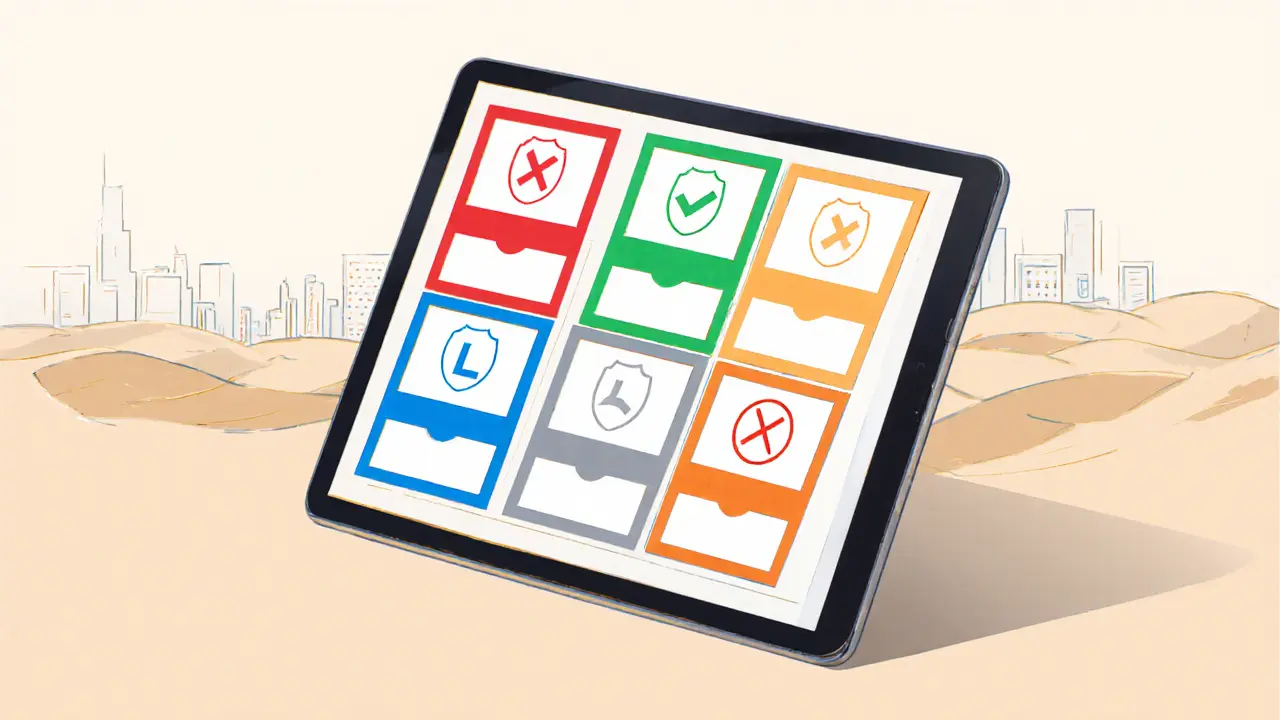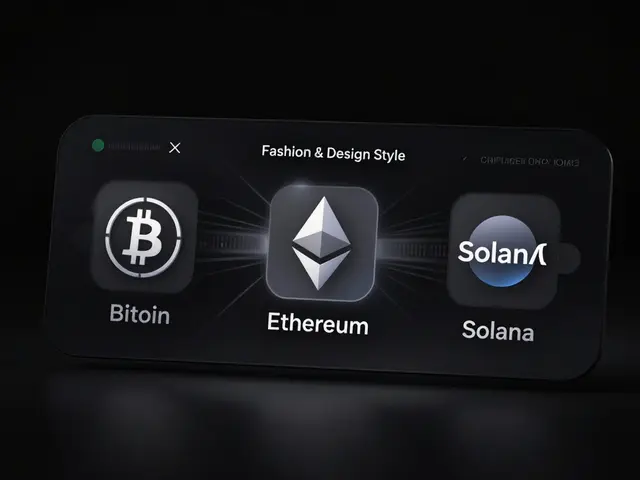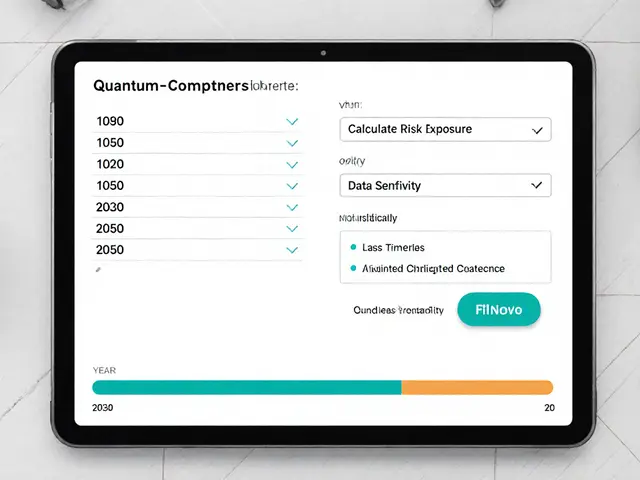GCC Crypto Banking Policy Checker
Select a GCC country below to view its current crypto banking status and licensing requirements.
Saudi Arabia
Restricted + ManagedBanks need SAMA approval for crypto transactions
UAE
Licensed Token FrameworkOnly approved tokens allowed (e.g., Dirham Payment Token)
Qatar
Total ProhibitionFull ban on crypto, except tokenized assets
Kuwait
Absolute ProhibitionNo crypto banking, mining banned
Bahrain
Licensed Crypto-Asset ModuleBanks can offer approved services under CRA license
Oman
Draft FrameworkProhibited until new licensing framework is released
Detailed Policy Lookup
With more than $4trillion in digital assets circulating worldwide, the Gulf region has become a testing ground for how governments balance financial stability, economic diversification, and sovereignty. The result is a crypto banking bans patchwork that lets some banks dip their toes in blockchain while shutting others out completely. If you’re a fintech founder, an investor eyeing the Middle East, or simply curious about why you can’t use a Saudi bank to buy Bitcoin, this guide walks you through every major policy, the players behind them, and what the next few years might hold.
Regulatory Landscape Across the GCC
Across the Gulf Cooperation Council (GCC), regulators have taken three broad stances:
- Permissive licensing - allowing banks to offer limited crypto services under strict oversight (e.g., Bahrain).
- Controlled restriction - banks may engage only with approved tokens or after explicit approval (e.g., Saudi Arabia, UAE).
- Total prohibition - all crypto‑related activities are barred for financial institutions (e.g., Qatar, Kuwait).
These approaches reflect a “patchwork quilt” of policies, as noted by Carnegie Endowment researcher Ala'aKolkaila, and are driven by two common goals: protect the financial system from volatility and use blockchain tech for sovereign digital currencies.
Saudi Arabia: Restricted Yet Progressive
Saudi Arabia is a key GCC market where the Saudi Arabian Monetary Authority (SAMA) classifies cryptocurrencies as non‑legal tender assets and imposes a "restricted + managed" regime on banks. Since a 2019 Ministry of Finance warning, banks must obtain explicit SAMA approval before touching any crypto transaction. The rule applies to retail trading, custody, and even advisory services.
Despite the ban, Saudi Arabia participates in the mBridge CBDC pilot alongside the UAE, China, Thailand, and Hong Kong. SAMA’s sandbox program lets fintech firms test blockchain use cases, suggesting a future where regulated crypto services could coexist with strict banking prohibitions.
United Arab Emirates: Licensed Token Framework
United Arab Emirates operates a token‑licensing system overseen by the Central Bank of the UAE, permitting only approved payment tokens such as the UAE Dirham Payment Token. Unlicensed crypto activity is illegal for banks, and the Central Bank enforces clear boundaries between permitted token usage and prohibited private crypto services.
UAE banks have been testing cross‑border CBDC interoperability through ProjectAber since 2019, positioning the country as a regional leader in regulated digital finance while keeping a tight leash on private crypto.
Qatar: From Total Ban to Tokenized Assets
Qatar maintains a comprehensive ban on cryptocurrency services for all financial institutions, enforced by the Qatar Financial Centre Regulatory Authority (QFCRA). The 2020 ban covered everything from Bitcoin trading to stablecoins. However, the Digital Asset Regulations2024 introduced a legal path for tokenized shares and bonds, while explicitly labeling cryptocurrencies as “Excluded Tokens.”
The QFCRA is drafting a broader digital‑asset framework expected to finalize in Q22025, which could become a model for regional standardization.
Kuwait: Aggressive Enforcement and Mining Crackdown
Kuwait has taken the most forceful stance by banning crypto mining and imposing severe penalties on any financial‑institution involvement in digital assets. Enforcement actions cut local electricity consumption by 55%, a clear signal that the Central Bank of Kuwait views mining as a threat to national resources and financial stability.
Like Qatar, Kuwait treats all private crypto activities as prohibited, leaving no room for licensed experimentation.

Bahrain: Licensed Crypto‑Asset Module
Bahrain offers a middle‑ground approach through the Central Bank of Bahrain’s Crypto‑Asset (CRA) module, which outlines permitted activities for banks under a licensing regime. Banks can engage in approved crypto‑asset services-such as custody or tokenized securities-provided they obtain a CRA licence and meet AML/KYC standards.
Bahrain’s active participation in CBDC pilots with JPMorgan and its interoperability tests suggest a strategy that embraces regulated crypto while keeping private, unlicensed tokens out of the banking system.
Oman: Emerging Frameworks and CBDC Participation
Oman is currently drafting specific crypto regulations that align with broader GCC trends, while already taking part in regional CBDC pilots. Though detailed rules are still in flux, the Central Bank of Oman signals that unauthorized banking activities will be restricted, with a future licensing pathway likely to follow Bahrain’s model.
Oman’s involvement in mBridge and other cross‑border projects shows that the country values blockchain infrastructure even as it tightens crypto‑banking rules.
Gulf Cooperation Council (GCC): A Coordinated Yet Divergent Effort
Gulf Cooperation Council serves as the political and economic umbrella for Saudi Arabia, UAE, Qatar, Kuwait, Bahrain, and Oman, fostering collaboration on CBDC pilots while allowing each member to set its own crypto‑banking policies. This coordination explains why all six nations are part of the mBridge initiative despite having wildly different domestic rules on private cryptocurrencies.
Comparison of GCC Crypto‑Banking Policies
| Country | Banking Status for Crypto | Licensing Regime | CBDC Involvement | Recent Policy Shift (2024‑2025) |
|---|---|---|---|---|
| Saudi Arabia | Prohibited unless SAMA approval | Case‑by‑case approval | mBridge pilot participant | Fintech sandbox expansion (2024) |
| UAE | Only approved tokens allowed | Token licence (Dirham Payment Token) | Project Aber & mBridge | New token‑licensing rules (2024) |
| Qatar | Full ban on crypto, except tokenized assets | Digital Asset Regulations2024 (tokenized shares/bonds) | mBridge participant | Regulatory framework finalization Q22025 |
| Kuwait | Absolute prohibition; mining ban | None - enforcement‑only | mBridge participant | Mining crackdown resulted in 55% electricity drop (2023‑2024) |
| Bahrain | Allowed under CRA licence | Crypto‑Asset (CRA) module | CBDC pilot with JPMorgan | Interoperability tests expanded (2024) |
| Oman | Prohibited pending licence | Draft framework (2025) | mBridge participant | Regulation draft released (2024) |
Implications for Crypto Users and Institutions
These bans create real friction:
- Liquidity constraints - Without bank‑backed custodians, traders rely on offshore exchanges, which can be less secure and more expensive.
- Limited institutional participation - Asset managers can’t offer crypto‑linked products inside the GCC, stunting fund growth.
- Workarounds and risk - Many users turn to peer‑to‑peer platforms or crypto‑friendly jurisdictions, exposing themselves to regulatory uncertainty.
- Opportunity for regulated sandboxes - Fintechs that secure SAMA or UAE approval can gain a first‑mover advantage in a market hungry for digital finance.
Future Outlook: Toward Gradual Liberalization?
Several forces suggest that the current strict regime won’t last forever:
- CBDC proof‑of‑concepts - As mBridge and national pilots demonstrate secure, fast settlements, regulators gain confidence in digital assets, opening the door for limited private‑crypto services.
- Economic diversification goals - GCC Vision2030 plans emphasize fintech as a growth engine, pushing governments to create regulated pathways for crypto‑related businesses.
- International pressure - Global AML/CTF standards encourage transparent licensing rather than blanket bans.
- Regional standardization - Qatar’s upcoming 2025 framework could become a template, prompting neighboring states to align for easier cross‑border compliance.
In practice, we may see a three‑phase evolution:
- Phase1 (2025‑2026): Expand sandbox programs, issue pilot licences for tokenized securities and stablecoins used in trade finance.
- Phase2 (2027‑2029): Introduce a limited‑scope “crypto‑banking licence” that allows custodial services under strict AML/KYC, likely first in Bahrain and the UAE.
- Phase3 (2030+): Harmonized GCC framework where private crypto can be offered by banks under a unified licensing rubric, similar to the EU’s MiCA regulation.
Until then, anyone looking to operate in the region should treat the current bans as firm-plan around them, use approved tokens, and keep an eye on sandbox announcements.

Frequently Asked Questions
Can I buy Bitcoin through a Saudi bank?
No. Saudi banks may only handle crypto after obtaining explicit approval from SAMA, and such approval has never been granted for retail Bitcoin purchases.
Which GCC country currently allows licensed crypto‑asset services?
Bahrain, through its Crypto‑Asset (CRA) module, permits banks to offer approved crypto‑related services under a licence.
What is the mBridge project?
mBridge is a wholesale Central Bank Digital Currency (CBDC) pilot that links the Saudi, UAE, Bahrain, and Oman central banks to enable real‑time cross‑border settlements.
Will Qatar eventually allow private crypto banking?
Qatar’s 2025 digital‑asset framework is expected to keep cryptocurrencies excluded, but it will legalize tokenized securities. A full banking‑crypto licence could appear after that, similar to Bahrain’s model.
How do the CBDC pilots affect the crypto bans?
CBDC pilots demonstrate that regulators trust blockchain technology for sovereign currencies. This success often softens attitudes toward regulated private crypto, paving the way for future licensing.






Edgardo Rodriguez
12 December, 2024 . 15:03 PM
When one examines the GCC crypto landscape, it becomes evident that each jurisdiction is navigating a delicate balance-between innovation, sovereignty, and systemic risk; the mosaic of policies, from Saudi Arabia's case‑by‑case approvals to Bahrain's CRA module, reflects deep cultural nuances, economic imperatives, and geopolitical calculations, all of which intertwine to shape the region's digital finance future.
mudassir khan
13 December, 2024 . 04:56 AM
In truth, the author merely enumerates regulatory stances without offering any substantive critique; the piece overlooks the underlying macro‑economic pressures, the divergent monetary policies, and the strategic use of CBDC pilots as political leverage-an oversight that undermines the very analytical depth one expects from such a report.
Bianca Giagante
13 December, 2024 . 18:49 PM
I appreciate the thorough overview; it’s clear a lot of effort went into gathering the details, and the balanced presentation helps readers understand both the opportunities and constraints across the Gulf nations.
Andrew Else
14 December, 2024 . 08:43 AM
Wow, another endless list-so helpful, really.
Susan Brindle Kerr
14 December, 2024 . 17:03 PM
Honestly, this feels like a drama series where every country is playing a different role-Saudi’s the strict parent, UAE the tech‑savvy teenager, and Kuwait the rebellious outcast, all vying for the spotlight in the crypto saga.
Jared Carline
15 December, 2024 . 04:09 AM
It is evident that while the GCC nations profess caution, the underlying ambition to dominate regional finance persists; nevertheless, any discourse that fails to acknowledge the strategic importance of national sovereignty in the crypto debate is fundamentally incomplete.
raghavan veera
15 December, 2024 . 12:29 PM
Thinking about the whole sandbox idea, it reminds me of how philosophy often tests ideas in a controlled setting before letting them loose in the real world; perhaps the Gulf’s cautious steps are just the logical extension of that approach.
Danielle Thompson
15 December, 2024 . 19:26 PM
Great job summarizing the policies! 👍 Keep it up!
Eric Levesque
16 December, 2024 . 02:23 AM
The GCC needs to protect its economy first, not chase after every crypto fad.
alex demaisip
16 December, 2024 . 10:43 AM
From a macro‑regulatory perspective, the fragmentary licensing frameworks across the GCC represent a classic case of regulatory arbitrage; practitioners must navigate a patchwork of compliance matrices, AML/KYC protocols, and token‑specific licensing requisites, all while aligning with Basel III liquidity standards and regional monetary policy directives.
Elmer Detres
16 December, 2024 . 20:26 PM
Reading through the GCC policy landscape really makes one reflect on how interconnected finance has become; each country’s stance not only impacts local investors, but also echoes across the global ecosystem, influencing capital flows, risk appetite, and even the valuation of digital assets worldwide. The sandbox initiatives, for instance, serve as experimental labs where regulatory bodies can observe real‑time data, assess systemic risk, and fine‑tune their frameworks - a pragmatic approach that many jurisdictions could emulate. Yet, the stark contrast between Bahrain’s CRA module and Kuwait’s outright prohibition highlights the divergent risk tolerances and strategic priorities within the region. It’s fascinating to see how the mBridge CBDC pilot acts as a unifying thread, fostering cross‑border settlement capabilities while each nation retains its sovereignty over private crypto activities. Moreover, the incremental liberalization phases outlined - from sandbox expansions to full‑scale licensing - suggest a roadmap that balances innovation with prudential oversight. Investors should watch for the 2025 digital‑asset framework in Qatar, as its outcomes may set a precedent for harmonized standards across the Gulf. Meanwhile, fintech startups that secure early approvals from SAMA or the UAE’s token licensing board could gain a first‑mover advantage, tapping into a market hungry for regulated digital services. On the flip side, the total bans in certain jurisdictions underscore the real risk of regulatory backlash, pushing users toward offshore platforms that may lack robust consumer protections. Ultimately, the GCC’s journey illustrates a microcosm of the global debate: how to integrate disruptive technology without compromising financial stability. 🌍💡🚀
Tony Young
17 December, 2024 . 04:46 AM
Wow, the drama of crypto bans across the Gulf is like watching a high‑stakes thriller where every policy shift feels like a plot twist; the stakes are real, the implications massive, and the future uncertain.
Fiona Padrutt
17 December, 2024 . 11:43 AM
We need to stand proud of our national financial sovereignty, and the GCC’s measured approach shows true strength in protecting our economies.
Briana Holtsnider
17 December, 2024 . 18:39 PM
Honestly, the analysis is shallow; it fails to critique the underlying power dynamics and the way these bans serve elite interests while marginalizing everyday users.